The Intel Core i9-9980XE CPU Review: Refresh Until it Hertz
by Ian Cutress on November 13, 2018 9:00 AM ESTHEDT Performance: Office Tests
The Office test suite is designed to focus around more industry standard tests that focus on office workflows, system meetings, some synthetics, but we also bundle compiler performance in with this section. For users that have to evaluate hardware in general, these are usually the benchmarks that most consider.
All of our benchmark results can also be found in our benchmark engine, Bench.
PCMark 10: Industry Standard System Profiler
Futuremark, now known as UL, has developed benchmarks that have become industry standards for around two decades. The latest complete system test suite is PCMark 10, upgrading over PCMark 8 with updated tests and more OpenCL invested into use cases such as video streaming.
PCMark splits its scores into about 14 different areas, including application startup, web, spreadsheets, photo editing, rendering, video conferencing, and physics. We post all of these numbers in our benchmark database, Bench, however the key metric for the review is the overall score.
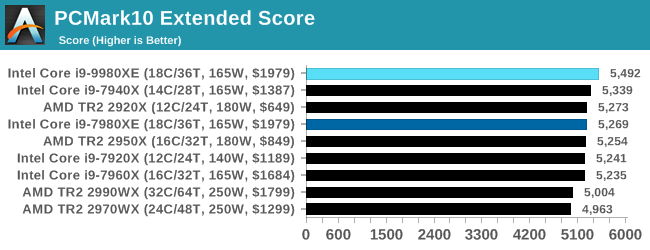
A small bump in the result here because of the added core frequency.
Chromium Compile: Windows VC++ Compile of Chrome 56
A large number of AnandTech readers are software engineers, looking at how the hardware they use performs. While compiling a Linux kernel is ‘standard’ for the reviewers who often compile, our test is a little more varied – we are using the windows instructions to compile Chrome, specifically a Chrome 56 build from March 2017, as that was when we built the test. Google quite handily gives instructions on how to compile with Windows, along with a 400k file download for the repo.
In our test, using Google’s instructions, we use the MSVC compiler and ninja developer tools to manage the compile. As you may expect, the benchmark is variably threaded, with a mix of DRAM requirements that benefit from faster caches. Data procured in our test is the time taken for the compile, which we convert into compiles per day.
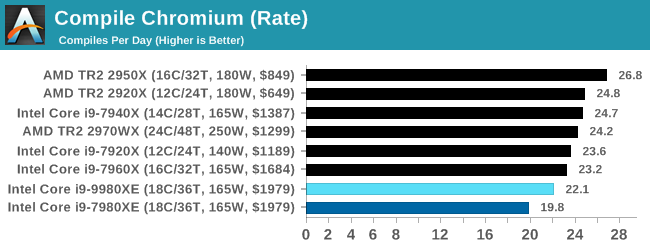
For the compile test, the 9980XE brings the 18-core up to being more competitive, however this test does seem to prefer fewer cores, lower crosstalk, and higher frequencies. AMD's 16-core TR2 wins here, adding 20% perf over the 9980XE for under half the cost.
3DMark Physics: In-Game Physics Compute
Alongside PCMark is 3DMark, Futuremark’s (UL’s) gaming test suite. Each gaming tests consists of one or two GPU heavy scenes, along with a physics test that is indicative of when the test was written and the platform it is aimed at. The main overriding tests, in order of complexity, are Ice Storm, Cloud Gate, Sky Diver, Fire Strike, and Time Spy.
Some of the subtests offer variants, such as Ice Storm Unlimited, which is aimed at mobile platforms with an off-screen rendering, or Fire Strike Ultra which is aimed at high-end 4K systems with lots of the added features turned on. Time Spy also currently has an AVX-512 mode (which we may be using in the future).
For our tests, we report in Bench the results from every physics test, but for the sake of the review we keep it to the most demanding of each scene: Cloud Gate, Sky Diver, Fire Strike Ultra, and Time Spy.
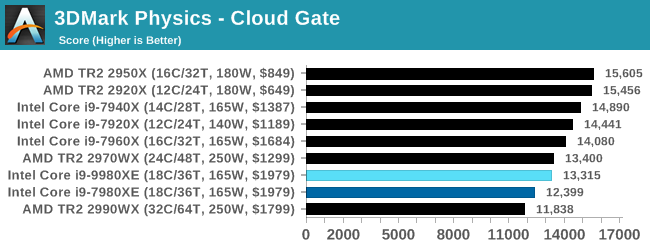
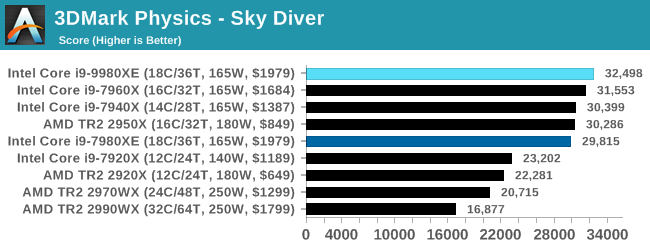
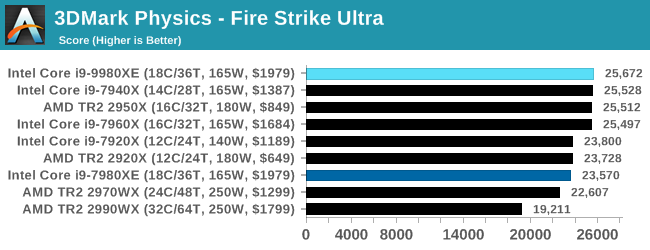
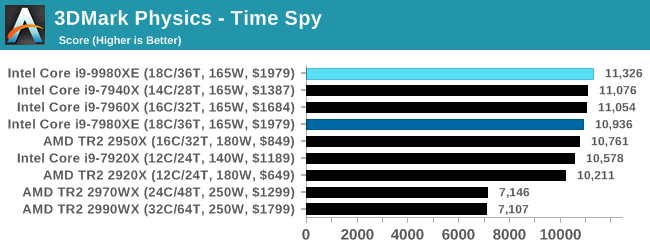
The newer engines can take advantage of the higher core count parts, and Intel's unified memory design also helps here.
GeekBench4: Synthetics
A common tool for cross-platform testing between mobile, PC, and Mac, GeekBench 4 is an ultimate exercise in synthetic testing across a range of algorithms looking for peak throughput. Tests include encryption, compression, fast Fourier transform, memory operations, n-body physics, matrix operations, histogram manipulation, and HTML parsing.
I’m including this test due to popular demand, although the results do come across as overly synthetic, and a lot of users often put a lot of weight behind the test due to the fact that it is compiled across different platforms (although with different compilers).
We record the main subtest scores (Crypto, Integer, Floating Point, Memory) in our benchmark database, but for the review we post the overall single and multi-threaded results.
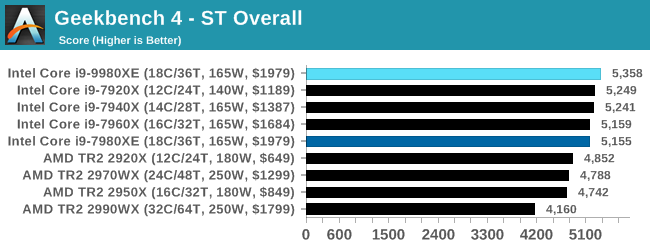
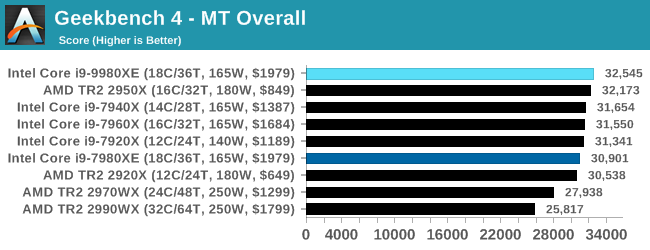










143 Comments
View All Comments
coder543 - Tuesday, November 13, 2018 - link
I think you mean that Inte's 1 or 2 cores often beat AMD's 1 or 2 cores. In benchmarks that are highly multithreaded, AMD beats Intel. Intel currently has a frequency advantage, so they win in the lightly threaded tests.coder543 - Tuesday, November 13, 2018 - link
Intel's*AnandTech and Twitter both need an edit button.
HStewart - Tuesday, November 13, 2018 - link
But my question in real life do you need this many core - I still think it better to have single thread core speed. I say that even as developer that uses multiple threads.GreenReaper - Wednesday, November 14, 2018 - link
Depends on what your real life is, doesn't it? That's why reviews don't have one benchmark and the final paragraph of the conclusion here emphasizes that the right processor for you depends on your workload, even *without* considering the relative prices. For many workloads none of the CPUs tested here are appropriate; a 2400G would be the most efficient, cost-effective option.twtech - Thursday, November 15, 2018 - link
Yes. I could use about twice this many. I also need good single-core clockspeed as well. That's why I'm eagerly anticipating the 3175x launch.bji - Tuesday, November 13, 2018 - link
Windows is garbage. Put these chips onto a real operating system (Linux) and you will see the actual performance they are capable of without Windows holding them back. See Phoronix.twtech - Thursday, November 15, 2018 - link
It's nice if you have that option. Most of the time the software you run only works on certain operating systems and you don't have much choice.Lolimaster - Thursday, November 15, 2018 - link
In benchmarks where the 2950X at 1K will score similar too? What's the point?AMD top dogs are on another whole level, if you got the workload for them, take them, else 2950X.
Arbie - Tuesday, November 13, 2018 - link
Typo - you wrote "Intel will need to up its game here to remain competitive". Should have been "Intel will need to up its marketing here to remain competitive".eva02langley - Tuesday, November 13, 2018 - link
Unfortunately, they are selling everything. I would be happy if they were not selling anything.